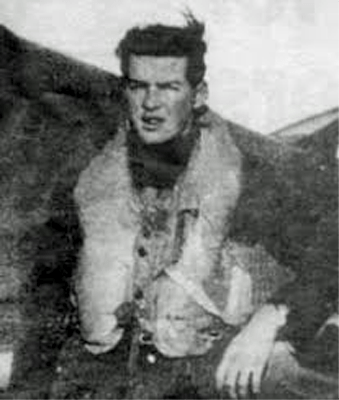Last time I mentioned the name of “Watty” Watson who was the High School’s only member of Churchill’s famous “Few” that I have discovered so far. I did find one other Old Nottinghamian who was in Fighter Command during the period of the Battle of Britain, but he did not fly the legendary Spitfire, yet another picture of a Mark I which I just cannot resist:
Instead, Flying Officer Walker flew the Bristol Blenheim Mark I which was desperately pressed into service as a night fighter:
While he was at school, “Watty” had been a keen rugby player for the First XV:
He was a keen member of the Second XI at cricket:
Most of all, he loved the Officers Training Corps:
As you look at the photograph the boy on the left is “Higgs” and the boy on the right is “MacKirdy”. The three behind, left to right, are JMT Saunders, Burley and MJ Dodds, as far as we know.
Eventually, “Watty” was promoted to Drum Major, every boy’s dream, having your own drum. Having your own leopard skin wasn’t bad either:
And in close up:
But if you have a big drum, then you’ve got to bang it, bang it loud and march like a maniac:
What’s that quotation?
“When I was a child, I spake as a child, I understood as a child, I thought as a child: but when I became a man, I put away childish things.”
So “Watty” gave up his drum and his leopard skin, but he was eventually given something he liked a whole lot better:
Here he is, in close up:
“Watty” gave his life for this country’s freedom on November 28th 1940. He was “Blue Two” and he was just 19 years of age.
If you ever want to put some flowers on his grave, “Watty” is buried in the Nottingham Southern Cemetery on Wilford Hill, off the A60 Loughborough Road, in Section M.24, Grave 74. We all owe him, and his colleagues, one hell of a debt.














They were so young. Now, we are all old men who can only imagine their fierce, loyalty and bravery Thanks, John, for these posts recognizing them.
I used to teach 18 year olds two lessons a week and it still amazes me that so many pilots in the Battle of Britain were only a year older. People nowadays worry that if we were in the same situation, we would just curl up and die but from what I’ve seen of them as 18 year olds we would find just as many fierce, loyal and brave young men as we found in 1940.
I agree with you, John.
I am filled with sadness reading this post. Such a young man. Too many young men.
Yes, there were too many young men but thank God that they stepped forward and played their part in saving the world from such evil doctrines and such foul deeds.
Young, yes, but with a sense of purpose. Who among us today at 19 has the attributes that Watty possessed?
Very few, I suspect, I did watch a short film the other day, though, about how they turned an ordinary 18 year old into an RAF officer during his training at the RAF college at Cranwell.
They succeeded in transforming him into somebody who clearly believed and said that he was the most wonderful thing you could be, an officer in the air force. I don’t think that we should be too worried about the younger generation. All they lack is direction and once somebody gives them that, they will “step up to the plate”.
Good to hear, John!!
Watty’s sacrifice will be remembered.
Let’s hope so. I do think that nowadays we are trying our hardest not to forget the people who gave their lives on our behalf, so perhaps in the future, their sacrifice will be remembered.
Good research as ever and a touching tribute. Good work with the pictures. That Blenheim is a rather ugly beast!
Thank you very much and I would second your views about the Blenheim, although on the other hand, those masters of style and design, the French, were doing their best to outdo us with the Bloch MB210 and indeed, any Bloch bomber of the era. Try googling some images of them and you’ll see what I mean.
What a shocker, I am willing to wager that it didn’t win many design awards!
Ahmen to that John. One of the finest in that band of men who are owed a great deal by us all.
One of my best Year 9 RS lessons about the Holocaust/racism in general was to show them what Hitler did in real terms. I had the black kids stand up, then the Asians, the two Jewish kids and so on. And then I got them to explain why Hitler would have had them all killed. Far from subtle, but it got the point across. And don’t doubt it. The Germans would have done all of that, along with killing Freemasons, disabled people, Jehovah’s witnesses, Communists, gays and other categories you don’t necessarily get in a Year 9 class.
Sometimes the direct approach is best John. I find children really struggle to understand the real truth and meaning of what actually happened. Doing it that way brings it home.
Thank you for sharing John and thank you Watty.
And thank you, Lloyd. I’m sure that Watty, up there still in his Spitfire, will have noted your thanks. How I wish he had lived beyond nineteen. He was such a complex character with self confidence of amazing levels.
As usual, your post again prompted further investigation. This time the Bristol Blenheim story fascinated me.
Yes, the Blenheim was not a very good aircraft. The short nosed version was used as a night fighter and the long nosed as a light bomber. The latter were desperately vulnerable and on at least one occasion a whole squadron took off and they all failed to return.
And one day you might get to give us all a detailed comparison of the Spitfire and the Hurricane.
I looked up the Bloch MB 210. How could the nation who built something as elegant as the Eiffel Tower create a mostrosity like that? It looks as if someone fitted wings and engines to a garden shed.
And there are lots more like it! Just google “1930s french bombers” and you can see aircraft almost beyond belief. I think a lot of it came from the fact that “the bomber would always get through” was the fashionable doctrine during that decade, and perhaps designers felt compelled to echo this sentiment by building aircraft that looked so formidable.
John, I know I’ve told you this before, but these posts are so hard for me to read. I have tears in my eyes. These are just boys! To understand that, to know that, somehow makes war all the more atrocious! And what you are doing by telling these stories, tells the world these “men” were just not soldiers, but real boys who grew up too fast and died much too young. By bringing the human element into war, hopefully will make some people stop up short and THINK what war really means up close and personal.
Absolutely. Back in the late 1960s, my teacher, who had fought in the First World War, told us that wars were invented by old men who knew they would never be asked to do any fighting and were fought by young men with everything to lose.
World War Two was a war that was difficult not to fight but even so, perhaps the politicians in 1919 at Versailles or in the early 1930s should have done lot, lot better to prevent any further conflicts.
My Dad fought in WWII. He was a haunted man. And like most who have seen harsh battle, never spoke unless he was very drunk, about what he did and saw.
I think that my Dad too carried some images around in his mind which he was loath to share. His biggest grumble was that he had wasted the best years of his life from 19-24.
” but he did not fly the legendary Spitfire, yet another picture of which I just cannot resist”
Only for a tad more detail – that is a genuine Mk1, so if you wouldn’t mind amending that to read:
of a Mk1 which I just cannot resist”
Appreciate your indulgence on this little detail, I’m HUGE on WW II aircraft types.
Pingback: My Book (2) | John Knifton